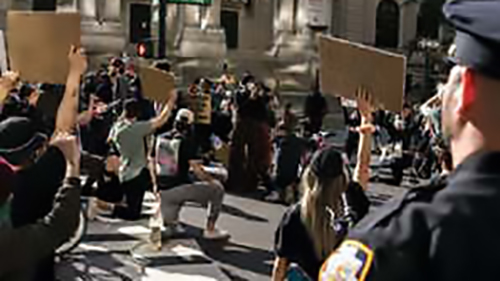New book analyzes the intersection of ethics and policing
UNIVERSITY PARK, Pa. — With national debate focused on the police and the principles that guide their work, a new book edited by two Penn State faculty members provides important insight into the ethical challenges facing the police and the criminal justice system.
In “The Ethics of Policing: New Perspectives on Law Enforcement” (New York University Press, 2021) an interdisciplinary group of scholars from across the social sciences, law, and humanities analyzes the ethical principles of policing and the role of police in the United States.
The book is edited by Ben Jones, assistant director of the Rock Ethics Institute (REI) in Penn State’s College of the Liberal Arts, and Eduardo Mendieta, Penn State professor of philosophy and REI affiliate faculty.
“The relationship between law enforcement and the multiple communities they police is a critical matter of public policy, and I am grateful for the scholarly intervention that Ben Jones, Eduardo Mendieta, and the contributors to their timely volume are making,” said Clarence Lang, Susan Welch Dean of Penn State’s College of the Liberal Arts. “’The Ethics of Policing’ not only speaks to the important work that the Rock Ethics Institute is doing for our University and the academy, but this book also exemplifies the importance of the liberal arts as a larger enterprise in promoting ethical judgment and decision-making, critical perspective-taking, and close consideration of the diversity of human experience in the making of policy.”
“In a democracy, policing is an institution subject to democratic input, but the exact relationship between the police and democratic institutions is complex and often a source of controversy. When you listen to discussions about police, people are not just making claims about what policing is, but are wrestling with what it should be. That’s why this book is important at this moment,” Jones said.


“One of the things that motivated me (on this project) is, we need the police,” Mendieta added. “The question for us is, what type of police? The police serve ethical and political justice for all of our society, and therefore, what motivated me is that we should hold police officers – and the police as a system and as the face of the state – accountable to those normative principles.”
Police officers make decisions all the time, making judgment calls about whether to pull someone over, for example, whether to search a car, whether to follow someone, or whether to use force, and in some cases, whether to use lethal force.
“At the core of our book is that the police perform an ethical function, and therefore they are beholden to ethical norms,” Mendieta explained. “The primacy of protecting life; the primacy of the presumption of innocence; the presumption of the controlled use of force; the presumption that the police are at the service of society; the presumption that the police are not warriors, military soldiers, or people who are entitled to use excessive, unjustified force; the presumption that the police officer should give primacy to the life of the citizen over their own life. All of those are ethical norms that give cohesion to the police.”
“The Ethics of Policing” evolved directly out of the Ethics of Policing Conference hosted by REI at Penn State University Park in September 2018. It is part of the conversation sparked by protests in Ferguson, Missouri, over the 2014 police shooting of Michael Brown, Jr., and the 2020 mass protests in response to the police killings of George Floyd, Breonna Taylor, and other Black lives.
“Policing faces a legitimacy crisis. Many doubt the legitimacy of the police because of the disproportionate harms that current law enforcement practices inflict on marginalized communities. The status quo is morally unsustainable, which demands that we fundamentally rethink what public safety looks like,” said Jones.
The book’s twelve essays cover myriad topics and are divided into four sections: the role of police; use of force; race, bias, and resistance; and policing’s past and future.
“The police are the point of entry into the criminal justice system, and the police are also the first political contact that we have with our state, with our government. They are the physical presence of our government, and they are the face of our commitment to law enforcement. We just felt the need to address what’s going on with the police in our society, and why there is an ongoing crisis with this key democratic institution,” said Mendieta.
In addition to Jones and Mendieta, the other scholars contributing to the volume are:
- Nicolas de Warren, associate professor of philosophy at Penn State
- Daniel Susser, assistant professor in the College of Information Sciences and Technology and research associate in the Rock Ethics Institute at Penn State
- Lisa Guenther, Queen’s National Scholar in Political Philosophy and Critical Prison Studies at Queen’s University
- Sally Hadden, associate professor of history at Western Michigan University
- Joy James, Ebenezer Fitch Professor of Humanities at Williams College
- David Klinger, professor of criminology and criminal justice at the University of Missouri-St. Louis
- Tracey L. Meares, Walton Hale Hamilton Professor and founding director of the Justice Collaboratory at Yale Law School
- Jake Monaghan, assistant professor of philosophy at University of New Orleans
- Michael Sierra-Arévalo, assistant professor of sociology at the University of Texas at Austin
- Michael Walzer, professor emeritus of social science at the Institute for Advanced Study
- Vesla Weaver, Bloomberg Distinguished Professor of Political Science and Sociology at Johns Hopkins University
- Franklin Zimring, William G. Simon Professor of Law at the University of California, Berkeley
